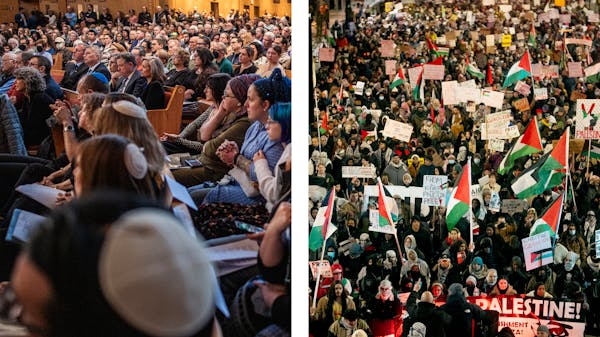A couple dozen people squeezed into Steve Hunegs' living room in St. Louis Park on Wednesday night, the seventh night of Hanukkah. There were attorneys and members of law enforcement, a former college president and community leaders, activists and journalists.
Hunegs, executive director of the Jewish Community Relations Council of Minnesota and the Dakotas, had invited them for the first private screening in Minnesota of a gruesome 45-minute video.
"October 7, 2023," read the small words on the big television screen. "Hamas Massacre. Collected Raw Footage."
A representative of the Consulate General of Israel to the Midwest had traveled from Chicago with the recording on his phone. In the days after the Hamas terrorist attack that sparked the current war in Gaza, the Israeli government compiled hundreds of hours of footage of the attack and edited it down into the most vivid and complete rendering yet of the day's horrors. Most of the footage came from body cameras or cellphone cameras Hamas fighters used to record or livestream their attack. Out of respect for the dead, the Israeli government has not publicly released the recording, instead showing it in small private screenings as a reminder of what happened that day.
"It's important that you see the truth — what really happened," Itai Biran, consul for political and commercial affairs at the consulate, told the group. "When you hear about atrocities or massacres or hostages, these are just words. But when you see it with your own eyes — and you'll see it — it is something else.
"We didn't know at the beginning if we wanted to screen it or not. But we are fighting for the truth. Some people compared it to the Emmett Till incident, where the casket was open. So people could see the atrocities with their own eyes."
The screening was the only one planned locally and held at a key moment in the war. International outrage has zeroed in on Israel's overwhelming military response to the Hamas attack, with the Gaza death toll reportedly approaching 20,000, including more than 7,000 children. In media coverage and on social media, much of Gaza appears reduced to rubble, a humanitarian crisis deepening in real time.
Just the day before, President Joe Biden had warned Israeli leaders that they were losing international support for the war. Biden and Israeli Prime Minister Benjamin Netanyahu, who hugged on a Tel Aviv tarmac just two months before, appear increasingly at odds, specifically about what Gaza will look like after the war. Reports indicated the U.S. is pressuring Israel to end its ground war by the end of the year.
The video began.
Much of the video had previously been posted — some on Hamas social media, some on news outlets — but seeing it strung together underscored the scale of carnage. Dead children, burned bodies, mutilated bodies. A Hamas fighter shooting a dog three times. Another shooting out the tires of an ambulance next to a children's playground.
An Israeli first responder arrived at the music festival where hundreds of Israelis were slaughtered. He took video of body after body after body: "Can anyone give us a sign of life?" No answers.
In Hunegs' living room, one horrific scene followed another. The video felt intensely personal: terrorists barging into homes, their labored breathing audible. One asked his comrade to take a video as he fired three rounds into a lifeless Israeli body, then said he wanted to redo the scene.
When a fighter beheaded a dead Israeli soldier, several viewers looked away.
A father rushed his two elementary-age sons into a hiding place. A Hamas terrorist lobbed in a grenade. The father was killed. The bloodied boys ran back to their kitchen, screaming: "Daddy, Daddy!" and "Why am I still alive?"
One of the boys appeared to have lost an eye. Just feet away, the Hamas fighter raided their refrigerator for a cola. Some viewers began to cry.
"You're left breathless by the barbarity, by the atrocity, by the satanic nature of the actions of the terrorists — through their own video, glorifying their heinous actions," Hunegs said afterward.
"It gives you a very vivid, albeit very difficult, insight into what Hamas really is," said Mike Ciresi, a prominent Minnesota attorney who, like the majority of people at the screening, is not Jewish. "They're not a government. They're not a representative of the Palestinian people. They're terrorists. They're just terrorists. Period."
More than 300 Israeli soldiers were killed that day, and more than 900 Israeli civilians, according to the Israeli government. More than 240 people were taken hostage.
"No one wants to watch this," said Joe Tamburino, a Minneapolis attorney who was a law school friend of Hunegs. "But people should watch it. It's not been forgotten, but the narrative has changed."
"This is not the goal, to refocus the narrative," said Biran, the representative from the Israeli consulate. "The goal is to show the truth. Oct. 7 has happened. You cannot deny it. We found ourselves fighting for that very basic truth. We all have short memory. We need to make sure no one forgets."
At the end of the recording, one more slide popped up on the screen. Its words indicated that the past 45 numbing minutes had shown the murders or the murdered bodies of 135 people. That accounted for about 10% of the day's victims.

'Safe recovery sites' would offer syringes, naloxone and more to people using drugs. The plan could be in peril.
New Minnesota GOP leaders seek peace with party's anti-establishment wing

Who is Republican Lisa Demuth, Minnesota's first House speaker of color?

